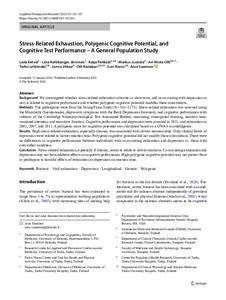Stress-Related Exhaustion, Polygenic Cognitive Potential, and Cognitive Test Performance - A General Population Study
Ketvel Laila; Keltikangas-Järvinen Liisa; Pahkala Katja; Juonala Markus; Ahola-Olli Ari; Lehtimäki Terho; Viikari Jorma; Raitakari Olli; Rovio Suvi; Saarinen Aino
https://urn.fi/URN:NBN:fi-fe2023032933663
Tiivistelmä
Background
We investigated whether stress-related exhaustion (chronic or short-term, and co-occurring with depression or not) is related to cognitive performance and whether polygenic cognitive potential modifies these associations.
Methods
The participants were from the Young Finns Study (N = 541-1273). Stress-related exhaustion was assessed using the Maastricht Questionnaire, depressive symptoms with the Beck Depression Inventory, and cognitive performance with subtests of the Cambridge Neuropsychological Test Automated Battery, measuring visuospatial learning, reaction time, sustained attention, and executive function. Cognitive performance and depression were assessed in 2011, and exhaustion in 2001, 2007, and 2011. A polygenic score for cognitive potential was calculated based on a GWAS on intelligence.
Results
High stress-related exhaustion, especially chronic, was associated with slower reaction time. Only clinical levels of depression were related to slower reaction time. Polygenic cognitive potential did not modify these associations. There were no differences in cognitive performance between individuals with co-occurring exhaustion and depression vs. those with only either condition.
Conclusion
Stress-related exhaustion, especially if chronic, seems to relate to slower reactions. Co-occurring exhaustion and depression may not have additive effects on cognitive performance. High polygenic cognitive potential may not protect from or predispose to harmful effects of exhaustion or depression on reaction time.
Kokoelmat
- Rinnakkaistallenteet [27094]
